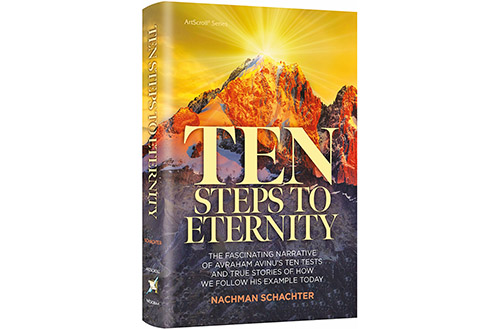
Highlighting: “10 Steps to Eternity: The Fascinating Narrative of Avraham Avinu’s 10 Tests and True Stories of How We Follow His Example Today,” by Nachman Schachter. Mesorah Publications Ltd. 2022. Hardcover. 199 pages. ISBN-13: 978-1422632345.
(Courtesy of Artscroll) Nachman Schachter’s “Ten Steps to Eternity” is a unique book. It is a sefer that examines the 10 nisyonos of Avraham Avinu through the eyes of the midrash, with fascinating details and thought-provoking insights. It is also a book of true stories —fantastic, inspiring stories — about Avraham’s “children,” contemporary Jews who have incorporated Avraham’s beliefs and accomplishments into their own lives.
We read about Avraham’s courage in leaving his homeland at Hashem’s command: “Lech Lecha.” And we see that courage, again, in stories of Avraham’s children, as they face deadly danger to escape from Iran’s brutal regime. When a group of unlearned Jews in Tbilisi, Georgia, lie down in front of an army of bulldozers to protect their shul from demolition; they are merely following in the steps of their father Avraham, who would not yield as the Satan tried to stop him on his way to the Akeidah.
Be inspired and illuminated by the details of Avraham Avinu’s 10 nisyonos, his 10 triumphs. And be amazed by Avraham Avinu’s children —– our fellow Jews —– who so courageously and faithfully follow his holy path.
The following are excerpts from the book related to the current parshiyos hashavua.
• • • •“Avraham’s tenth test was Akeidas Yitzchak. Through incredible devotion and deep emunah in Hashem, Avraham passed this test, which was the hardest and most challenging. Below are just some of the reasons why this test was the most difficult one for Avraham:
1. Many years earlier, Sarah told Avraham to send Yishmael and Hagar from his home. At that point, Hashem made a promise to Avraham and said, ‘Do not be distressed that you are sending them away, because your descendants will come from Yitzchak.’ Years later, Hashem appeared to Avraham and said, ‘Take your son … Yitzchak, go to Har HaMoriah and bring him up as an olah.’ This command was seemingly in direct contradiction to Hashem’s earlier promise.
2. The act of taking the life of his own son would be a contradiction to all that Avraham believed in and had been preaching his entire life. Wherever Avraham traveled, he humbly preached his creed: humanity should end its idol worship and its abhorrent, wicked ways — including human sacrifice, and follow Hashem and His merciful ways. The act of slaughtering his son, Yitzchak, would undo a lifetime’s worth of effort that had successfully influenced mankind to recognize and accept the merciful Hashem Echad — one and only God.
3. Receiving reward in this world or the next meant nothing to Avraham. Avraham’s goal in life was to spread awareness of the existence and Kingship of Hashem in the universe. Having a son who followed in his ways meant that his life’s goal would be fulfilled and perpetuated. By following Hashem’s directive to sacrifice Yitzchak, all that was important and meaningful would end with Yitzchak’s death.
Avraham’s response to these difficulties was to do what Hashem commanded him to do. He prepared for and approached the Akeidah with an enthusiastic, joyous and spiritually uplifted disposition. He brought Yitzchak to Har HaMoriah and placed him on the altar, just as Hashem had commanded him. By following Hashem’s precise words with loyalty and devotion, he passed the test of the Akeidah. Although this 10th test was the most difficult for Avraham Avinu, one fact stands as a bastion of strength and a beacon of light to the Jewish nation forever. Never was there a second or even a millisecond, when Avraham wavered regarding whether or not to perform Hashem’s command. His only wish was to wholeheartedly do the will of his Creator.
• • • •Insight: A Different Reason — The Chasam Sofer (Orach Chaim, siman 208) explains a different reason for why the test of the Akeidah was so difficult for Avraham: We do not know or have any understanding of why Hashem instituted the bringing of korbanos (offerings).
However, Avraham and Yitzchak were individuals with great wisdom and vast knowledge, who did understand all of the nuances of why Hashem commanded us to bring korbanos. That being said, Avraham and Yitzchak clearly knew that it was not possible that Hashem would ever ask anyone — under any circumstances — to sacrifice a human being to Him. Therefore, when Avraham heard the command from God to offer his son as an olah, Avraham did not understand what God wanted.”











